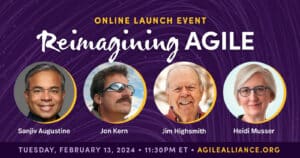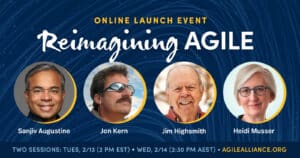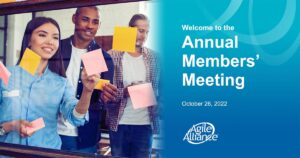Dr. Dave:
Hello, and welcome to the KnolShare with Dr. Dave Podcast. I am Dr. Dave Cornelius, your host. My conversation today is with Ann-Marie Kong. Ann-Marie, how are you today?
Ann-Marie:
I’m good, thank you, Dr. Dave. It’s a delight to be here today.
Dr. Dave:
Yeah, me too. You know what? Tell us a little bit about you and your superhero.
Ann-Marie:
My superhero.
Dr. Dave:
Yeah.
Ann-Marie:
So a bit about myself, I serve as a Transformation Leadership and Co-active Agile Coach, and as a Transformation Leadership Coach, I empower leaders to transform by unlocking your potential one conversation at a time, one leader at a time. So love is really at the heart of what I do and it’s who I be and what I do. I want to see more love in the world. I want to live in a world where we love the divine source. I believe in a divine source, I recognize not everybody does, and I’m not here to force my belief on anyone, but I want to see that world where we love God, the divine source, and we love each other. That’s what God wants for us, to love each other, sharing love in the world. So that’s my superpower. My superpower is love.
Dr. Dave:
Matter of fact, it’s my word for 2021. My word for the year is love. Yeah. So tell me, how have you experienced social justice in your work, community and family?
Ann-Marie:
Social justice while we’ve made progress, for sure, we are able to vote, most of us have access to public education. There’s a lot more work to be done and in my own experience, there isn’t a balance of wealth and privilege. I didn’t grow up with wealth and privilege. I’m a daughter of immigrant parents. My parents came from China. And I am an immigrant to this country. I live in Canada now. And as an immigrant, I worked hard. I studied hard. I worked hard to progress forward. Those were values that my parents instilled within me. And for me, that’s my experience, true hard work to progress forward. There wasn’t wealth or privilege that I had. So wealth and privilege is not something that I experienced at all and there isn’t that balance of wealth and privilege at all.
Dr. Dave:
Well, certainly, that’s true. So if we look at about social justice or even social injustice, based on your experience, how is that different from what you’ve seen in the United States? Or is it the same? Recently we’ve seen people marching in the streets, people dying, and it’s a long history of social injustice across the world, period. So where you live in Canada, compare that would watch you have seen in the United States.
Ann-Marie:
What I see in the United States really saddens me, first of all, I want to acknowledge that. There’s a lot of grief and a lot of sadness. I want to acknowledge that first of all. I see a divide in the US which is different from the experience I’ve had and what I’m having here in Canada and what I’ve lived for in my country of origin. It’s a divide of people in the US, is what I’m seeing, between BIPOC and non BIPOC, if you want to call it that? Right?
Dr. Dave:
Yeah.
Ann-Marie:
Yes. So there’s that divide and the images and the language media and society and our systems continue to reinforce that divide. And also we have lived experiences, the people living in the United States have lived experiences and culture and history deep into the psyche of people. Each person is a unique being and each has different lived experiences that makes that conversation between BIPOC and non BIPOC could be a very uncomfortable conversation to be had. And oftentimes strong emotions come up in that conversation and we’re not skilled in being able to have these conversations, but they’re important conversations to be had, for sure.
Dr. Dave:
Oh, without a doubt. And I think some of those conversation is starting. We’re having one right now.
Ann-Marie:
Absolutely.
Dr. Dave:
Yeah. So as a BIPOC person, why don’t you share an Asian or Pacific Islander experience with social justice based on what you’ve seen or it could even be something that you’ve experienced through someone else.
Ann-Marie:
Being a Pacific Islander, living in Canada, I can live in Canada now, I’m a minority in a predominantly Caucasian patriarchal country, I acknowledge that. Which is different from the country of origin. I was born in Trinidad.
Dr. Dave:
Oh, wow! Really?
Ann-Marie:
Yeah.
Dr. Dave:
No way! You’re Trinidadian?
Ann-Marie:
I am.
Dr. Dave:
I was picking up on something. I’m going to like…
Ann-Marie:
Subtle. My accent is very subtle.
Dr. Dave:
Right.
Ann-Marie:
So being Trinidadian, I grew up in a close-knit community where my neighbors, our neighbors were of different ethnic backgrounds, different race and they are an extended part of our family. You call them [Chinese 00:05:43]. That’s the Chinese term we call them, but they were of African descent. And they’re part of our family and we’re closely knit and they were always there for us and our Indian neighbors across the road, they’ll be celebrating, we’d celebrate together. They’re just part of our family. And I also grew up in a high school that was of Catholic religion. So with these influences really in my life, I learned then not to judge based on differences.
So it doesn’t mean that I don’t see color. I see color. I choose not to judge by color. So that’s a big difference. And it’s not to say that I don’t have biases either. I have a brain, but the thing is I choose not to be influenced by that. To have wisdom, to not to be influenced.
Dr. Dave:
So I grew up in the West Indies too, in the US Virgin Islands. So the next time you and I are in the same space, we’ll have some chutney together.
Ann-Marie:
Absolutely. Oh, that sounds delicious. You’re making my mouth water.
Dr. Dave:
Oh, man. That would be awesome. My brother-in-law is from Trinidad as well, so it’s cool. So I grew up with lots of people from Trinidad. So you’re a Co-active Coach. Talk to me, how would you coach someone through the trauma of social justice challenges?
Ann-Marie:
With trauma, I would meet my client, coaching through someone with social justice challenges, that trauma of it, I’d hold space for my client, holding that safe and courageous space for my client to process whatever emotions is present in that moment. Listening with compassion and empathy, being with, witnessing my client.
Here’s the thing, trauma is the notion of being separated from oneself and from others and from the world, that’s the definition of trauma. So with trauma, I would just hold that space for my client to process the emotions. Emotions are not good or bad. Emotions are energy in motion and we just let the emotion, to process in that moment.
And I lean into my intuition as well. I dance in the moment based on where my client’s at. I move where my client’s at and to be with my client every step of the way, letting my client just process those emotions. And in processing the emotions, I might invite my client to drop into their body and just take a couple of deep breaths. There’s a lot of wisdom in the body, when my client is able to drop into their body, they’re able to access that wisdom, they connect with their heart space and their true essence. And then in doing so, I might explore further with some powerful questions and my client come to the insight, whatever learning and insight they want to take forward from that experience in the moment.
Dr. Dave:
Yeah. That could be a powerful thing. So talk to me about you. What are you doing personally to improve opportunities for Black Indigenous and People of Color, BIPOC in the Agile community, because I see you from different Agile events, Open Space and I know you’re probably doing wonderful things, but I would love to hear more about them.
Ann-Marie:
I am continuing to learn, when I say learn, so I’m taking a course right now, Compassionate Conversations, because we’re not skilled in having these conversations and I want to upskill myself first of all, to be able to facilitate and I am practicing, because a key part of the work is to practice. And I’m a strong believer in practice. I have practices, meditation practice, et cetera. So the strong element of practicing is words. To be able to facilitate then, to be skilled, facilitating conversations between BIPOC and non BIPOC, where we talk about race and racial injustice and other contentious topics that might come up. So being skilled and up-skilling is a way to share that with the community, as I gain the skills and continue in my practice.
And also framing language, learning the work of Dr. Ibram X Kendi’s work. He wrote the book on anti-racism. The framing is not to say that I’m not racist. I think before coming across his work, I would have said that, I’m not racist. And the framing is as you can see, I’m actually anti-racist. There’s a huge difference. They may sound quite the same, but they’re actually not, because when I use the framing, I’m not racist, it means to say, when we put not in front of thing, you’re actually psychologically reinforcing the thing that we do not do. So if I’m saying, “I’m not racist,” I’m actually reinforcing to myself, “I’m racist.” And that’s what I mean to say. I’m actually meaning to see an anti-racist, and against racism.
The thing is that we’re all the same in the sense that we’re all human beings and we want the same thing. We want the love and belonging and safety, to be respected. We want the same thing. So that’s what I see. And also in terms of what else I’m doing, I am finding and learning ways where I can be a better ally, an advocate, like coming on this show. That’s a huge invitation. To share my voice and to share what I’m doing and what I’m up to in this world of bridging, so that we can be more united together and sharing that love in the world.
Dr. Dave:
It’s beautiful. It’s beautiful to hear that. Sometimes we look at things that we would want to do, but if there was change that you would like to see, more of to see how BIPOC and non BIPOC people work better together, how do we integrate? How we share love, what would be the significant change that you would like to see?
Ann-Marie:
The one big, significant change phenomenally for myself and what I want to see more in the world is for people to really connect and reconnect with their divinity. Reconnecting with God, God lives in each of our hearts. It’s evolving your mindset where you are connected from being egocentric. Like the, I, the false, I and thinking that all of these labels that we see, we think that that’s us. That’s not truly us. Reconnecting with the true essence of yourself and connected with, there’s something larger than us. Like I said, regardless of whether you believe it or not, because I do recognize not everybody believes that there’s a larger life force than us, but for those of us that do believe there’s a God, there’s a divine, there’s a large of life force, reconnecting with that really enables us to see the face of God in each person.
I’m not seeing the label, like I’m Caucasian and you’re male, all these labels we have, they’re that, they’re labels. They’re ways that we self-identify, but they’re not truly us and our identity. The true identity is that spirit, soul are true essence of who you are. And that’s magnificent, because each person that’s beautiful, we’re a gift from the divine source. And if we connect back to that, that will make a whole world of difference in how we interact with each other and how we collaborate and co-create. And we’d be able to find those bridges to be united together.
Dr. Dave:
What do you think are some of the blockers, the impediments, that stops us from doing this level of integration with our true selves and the true selves of others? What are those impediments, do you think they are?
Ann-Marie:
Well, part of is we tend to see all these labels and we judge based on these labels. When I see you, I see the true essence of you and not all these labels. I put all those labels aside and I’m just connecting to your true essence. Then we start to find ways to form those bridges. But we don’t, we tend to judge based on differences. When I come from a place of seeing your true essence, I’m more curious, I want to know, Hey, Dave, what’s going on there? Tell me what you’re up to you. We’re just finding some ways where we can connect. If we can find something we have in common, even though we’re vastly different and have different lived experiences, maybe you like to read, and I like to read, and Hey, what book are you reading? And we find something in common. When we find something in common, we have then, a sense of connection. And with a sense of connection, I can then be able to see your perspective.
As opposed to if we’re talking about something and we have different perspectives, and we start to move further apart, emotions start to get heightened, then blood rushes to the brain. My body’s flooded with adrenaline and cortisol. The nervous system shuts everything down. And we move further and further away, and I can’t even hear anything anymore. But if we find something in common, we can then connect with the true essence of the person and then be able to then see your perspective, because your perspective is your lived experience. It’s your truth, for you. Just like my lived experience is my truth for me, it’s not go to a bad. It’s your lived experience and it’s my lived experience and we can then find a bridge between each other, what we have in common and how we can build those bridges and then build them stronger to be more united together.
Dr. Dave:
That’s really good. That’s really good. For us finding a way to find common ground through our humanity, is what I would like to say. If you would like to think about diversity, equity, inclusion and belonging, just having this perfect world, this utopia, what would that look like? What would that experience be?
Ann-Marie:
Well, that experience will to be magical. It will be love. That we love each other and we appreciate the differences in each other with that love. It’s at the heart of it, it’s the bottom line. Yes, there’s work to be done. I’ve come across the work. So diversity and inclusion is actually not enough. I came across this work from Hamlin Grange. He’s a senior consultant with DiversiPro in Toronto. And he’s shared that there’s this notion of Intercultural Competence that we’re having to develop. Many companies talk about diversity, the different mix, which is the who, there’s inclusion, which is the mix feeling valued and included. To get to inclusion and really for that mix to feel included and valued, is in the intercultural competence, which is around having the capability to shift perspectives, cultural perspectives, and adapt accordingly based on cultural, commonalities and differences.
It’s growing again in your development. I also, I mentioned the work of Bob Kegan and Lisa Lahey, their adult development work is that the mindset evolves and shifts from being this socialized mind where I’m looking for validation, from externally. My self-worth validated from external, from others. Whereas I evolved to the self-transformative mind, that I’m not my emotions and my thoughts. I have thoughts and emotions, so I tend to see them as objects. They come and they go. So that the true I is back to the essence, your soul, which is connected to love. God lives in our heart and he lives in your heart. And if I can see that in each interaction with whomever I’m having the interaction with, then our world is going to be so much different, Dr. Dave. And that’s why I love being here with you in this moment.
Dr. Dave:
Likewise, but tell me, what was the name of the speaker or that leader again? And what was his topic?
Ann-Marie:
Yes. It’s Hamlin Grange. He’s a senior consultant with DiversiPro in Toronto, and he’d given a talk on Intercultural Competence. [crosstalk 00:18:43] Cultural competence, which is how to make that mix work. We have that, which is the mix. We have to know how to make that mix work, which is the intercultural competence. And it’s measured by your intercultural development index, if you will. So that’s like a survey and an index, there’s research and data based on this. And based on having those two, your diversity and intercultural competence, you then develop inclusion, basically. Inclusivity won’t just come about magically. We wish it did happen [inaudible 00:19:18] had a magic wand.
Dr. Dave:
No pixie dust and it happens. No?
Ann-Marie:
No pixie dust. I wish it worked that way.
Dr. Dave:
Oh, and anything else you would like to say in closing? Any final words, any final thoughts that you would like to just leave everyone with?
Ann-Marie:
I would say that faith plants the seeds and love makes it grow. So just love, share love in the world.
Dr. Dave:
Thank you so much, Ann-Marie, thank you for giving us your time today and your energy. We really appreciate you coming on and actually, just thank you for coming to the Agile for Humanity Conference. I was so pleasantly and happily surprised to see you there and to be with you in that space and time.
Ann-Marie:
Thank you.
Dr. Dave:
Thank you. So let me just close and say, thank you for listening to the KnolShare with Dr. Dave Podcast. I hope this learning experience would also prompt you to take and seek more and discover how you can contribute to a positive experiences for BIPOC lives. It really doesn’t take much. All we need to do is to tap into our own humanity.
So here’s a few places that you could find this recording. You’ll find the Agile for Humanity Podcast at KnolShare with Dr. Dave Podcasts on iTunes, Google Play and Spotify, and also you can find it in the following websites. You’ll find it on agilealliance.org., knolsharewithdrdave.com, grokshare.com, knolshare.org and agileforhumanity.org. And then the Agile Alliance have this on their sharing BIPOC stories under the webcast section.
The music for this podcast is done by my niece, Kayanna Brow-Hendrickson.
This podcast is Copyright 2021, KnolShare and Dr. Dave Cornelius.
So I would say until next time, be well, stay safe and connect soon. And based on what Ann-Marie just said, let’s do this with love the next time we connect, or even whilst you’re listening to this podcast.
Do it in the spirit of love. See you guys soon.
(Singing)





